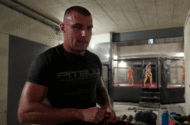Exclusive: VADA’s Dr. Margaret Goodman Looks to Clean Up Doping in MMA; Says Fighters Need A Union
By Michael Hatamoto
The Voluntary Anti-Doping Association (VADA) is gaining a significant amount of attention from the MMA community, as the group looks to test fighters wishing to prove they are clean.
Full Contact Fighter recently spoke with Margaret Goodman, VADA President and Board Chairman, learning more about the anti-doping agency and its efforts.
It may appear that VADA appeared out of no where and started showing interest in testing fighters, which isn’t necessarily true. As the talk regarding TRT and steroids continues in MMA, fans are left wondering if there is a PED problem currently plaguing the sport.
“Every sport has a PED problem. Unfortunately in MMA, everyone wanted to look the other way. All you have to do look at the increasing numbers of MMA athletes caught–and this is with only a few jurisdictions testing. When you take into account the commissions testing are using limited profiles–not performing routine blood testing after a fight, performing rare random unannounced testing, no one following blood counts (to look for blood doping) and no one testing for hGH, EPO, etc. those caught are the tip of the iceberg.”
VADA isn’t simply about testing athletes to ensure they are clean, as there are other matters that need to be addressed.
的t is to enable fighters to begin to take control over their career and health. Too often they are told what to do, what to take and how to train without asking the right questions and forming their own decisions. They often have little or no access to health care. As a result, you see what is happening in organizations like the NFL where years later players are realizing they didn’t ask the right questions and are now suffering from serious medical conditions that might have been avoided with proper rest and evaluation.
I strongly believe that irrespective of any federal oversight, MMA fighters need a union– a way for them to look out for themselves. VADA is one way for them to accomplish this goal, or at the very least, develop the right mind set.”
Fighters such as BJ Penn have sought additional drug testing, but it’s worth noting that VADA random testing is an added burden to the stresses of training camp. However, it’s something that combat sport athletes want to engage in to help show that success can be reached while clean.
“We actually are having an increasing number of boxers and MMA athletes contact us. It is a rigorous program, and the athlete must be ready to make this type of commitment during preparation for a fight. Most importantly, VADA wants to act as a resource for athletes, trainers, promoters and commissions. We want to educate them on harmful and illegal supplements in addition to proper safe training methods.”
The VADA random drug tests also include a wider variety of PEDs than what’s currently tested by athletic commissions, including the following:
“At the very minimum, VADA fighters undergo extensive profiles for anabolic steroids, masking agents, urine EPO, hGH, stimulants, B-2 agonists, drugs of abuse. We also use a testosterone to epitestosterone ratio of 4/1–the standard used by WADA, and we include carbon isotope ratio testing on every specimen to make certain anabolic steroid users don’t evade detection. VADA also evaluates athletes chemistry profiles and blood counts to help fighters better assess their current general health.”
Fighters are subject to random and unannounced drug testing — the way it should be — with the “highest trained and certified doping control officers” used to collect samples. The samples are collected by qualified officers that travel to the fighter’s location, and then rely on a WADA-accredited lab to test all collected samples.
It’s also interesting to hear that besides PEDs, VADA helps ensure fighters are training and cutting weight the proper way: “We also wish to help athletes avoid anemia which can weaken them during training.”
To finish our interview with VADA, the group had one last statement about its efforts related to PED testing:
VADA is a non-profit, and no officer or board member accepts anything a penny. In fact, it is these members that help to support the organization.
I hope that as time goes on, promoters, networks, etc. appreciate not only the value, but the necessity of clean sport, and reach out to VADA to help us make our services available to all fighters. If anything saddens me the most since VADA started, is the lack of support by athletic commissions in trying to expand testing and education of their personnel.
The UFC initially tried to have a hands-off approach to PED use, saying it’s up to the athletic commissions, but has admitted commission testing simply isn’t enough. I think it’s a shame that fighters need to seek out additional testing — as some sports include random PED testing — while MMA fighters routinely have little to fear from drug tests.
The athletic commissions have an offer to work with VADA and WADA to help better coordinate drug tests �even more so when some professional boxers have failed their VADA testing.
The thought of PEDs being heavily involved in MMA won’t go away soon, and we’ll have to wait and see how athletic commissions and the UFC plan to fight the growing epidemic.










